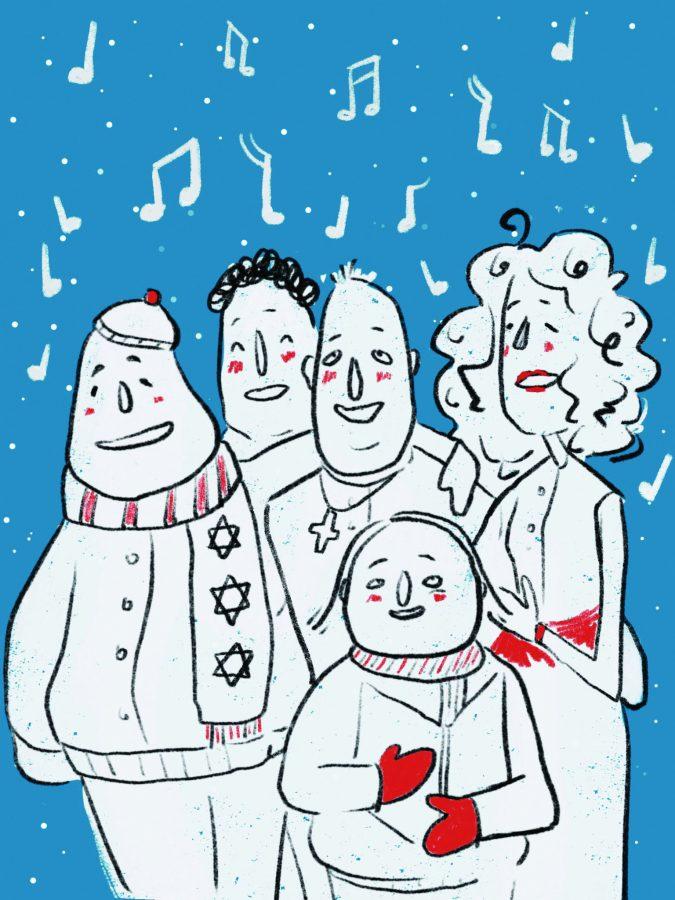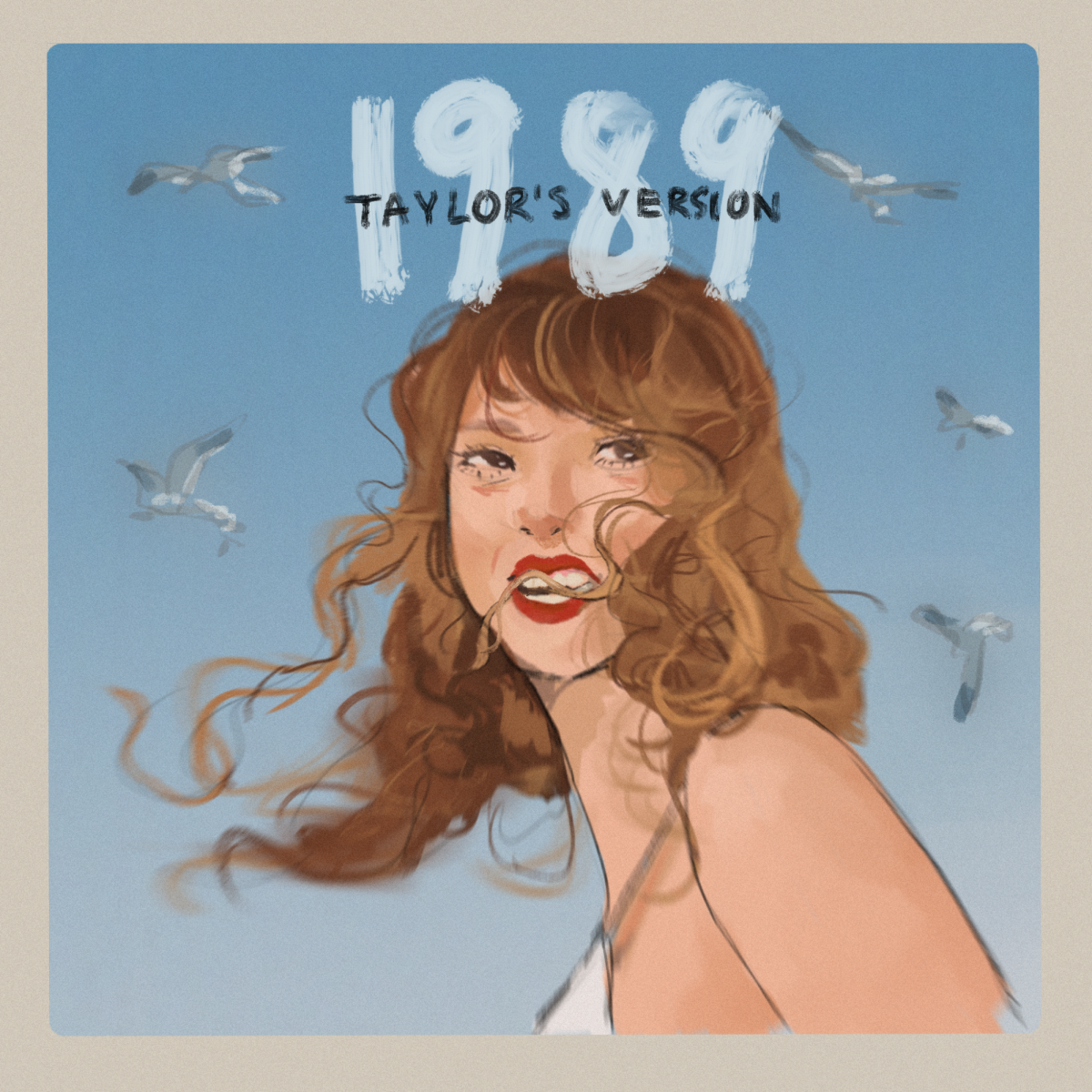As Bobby Helms’ “Jingle Bell Rock,” began playing on her car radio, Izzy Yanover ’19, creator and co-leader of the Jewish club, felt a wave of annoyance wash over her. It was the time of the year she said she can never escape: Christmas music.
“Almost every radio station plays Christmas music,” Yanover said. “Beverly Hills starts blasting it on the streets, and it’s the same here even at our own school. During the [Winterfest cookie decorating], all they were playing was Christmas music. While I think Christmas music is fun, there is still a lack of representation of music from other holidays. During this ‘Festive Week,’ [Harvard-Westlake] has had practically no representation of Hanukkah, not only with the music they’ve been playing, but also in the decorations they’ve put up.”
As Dec. 25 approaches, Christmas music is being played more frequently. According to statistics from 2017’s Spotify streams, Christmas music went from 1 percent of streams in early November to 22 percent of all streams on Christmas day.
Regardless of the discrepancies between the amount of Christmas music and other religious music played, music as a means of celebration is something that is shared across a multitude of religions. According to the Library of Congress, music is used not only in Christianity and Judaism but also in Buddhism, Islam and Hinduism.
Tara Reddy ’20, who practices Hinduism, said that for her family, music is an essential part of their religion, regardless of the time of year.
“A significant portion of our religious ceremonies, which are known as Puja, include music,” Reddy said. “Music is an integral part of our religion because it is through music that we pray. I wouldn’t say though that I feel excluded by Christmas music or wish Hindu music was more mainstream, since I do really enjoy holiday music. I think there’s a difference between the two because our music is not radio music but are for prayers.”
Mark Kligman, University of California Los Angeles’s chair of the Department of Ethnomusicology and specialist in Jewish music, said that music has always played an important role in Jewish culture.
“Music plays a role in Hanukkah, as it does in other aspects of Jewish life, where there is a significant functional role for music,” Kligman said. “The key rituals for the holiday include blessings that have melodies uniquely associated to them. Melodies have been written in the last 50 plus years to facilitate celebratory home and group experiences.”
Similar to most aspects of culture, the role Hanukkah and its music has played has evolved over time, Kligman said.
“One of the oldest melodies sung today in the Jewish tradition is Maoz Tzur, which is older than 200 years old,” Kligman said. “Now, Hanukkah serves as a gathering of family and friends and the music is celebratory. Hanukkah has adapted in American culture with a parallel to Christmas in that it serves as a family gathering and a gift-giving holiday. Nowadays, many holiday concerts include a Hanukkah song.”
However, Yanover said that she doesn’t see an increase in modern-day, mainstream Hanukkah music.
“It is very hard as a Jewish person to find music over the holidays,” Yanover said. “The Hanukkah songs that exist are either joke songs or are for little kids, which makes it so I don’t really feel tied to it. The role music plays is more linked to the aspect of listening to or singing it with my family, not the actual songs.”
Adviser of the Christian Club and upper school math teacher Michael Mori said that he sees Christmas music as divided into two different categories.
“There’s the secular, just about good feelings, family and holidays music, which is very nice,” Mori said. “And then, I think the religious aspect of it is probably twofold. One, it tries to tell the story, and [secondly] it tries to teach lessons in the lyrics. People have their beliefs, and it is nice to be able to hear in song and sing, kind of like the freedom of speech that this country is perhaps based on, your own beliefs.”
Students said holiday songs could also resonate with people who either do not relate to the religion the song was made for or to any religion at all. For example, while Lola Craig ’20, who identifies as an Atheist, said that she does not resonate with the religious content in holiday songs, she is not deterred from listening to or enjoying them.
“Despite the fact that Christmas music includes religious beliefs that I don’t believe in, I still really enjoy and love it,” Craig said. “The memories it brings me of being with family during Winter break brings on a sense of joy that cannot be mirrored at other times of the year. Music during the holidays is incredibly uplifting and brings on a particular feeling of love and cheer that is hard to be replicated elsewhere.”
Furthermore, Craig said that being able to separate herself from the religious meaning of a song allows her to enjoy the song more.
“I just don’t worry about what the religious connotations of the songs are,” Craig said. “Focusing solely on the melody of a song and how it makes me feel has enabled me to appreciate and just enjoy the music instead of getting caught up in the literal meanings of these songs or the stories they are trying to tell.”
On the other hand, Mori said that he believes it is important to find a balance between the purely fun and secular holiday music and the music that holds a deeper religious meaning.
“There is the traditional ‘White Christmas,’ type song which is just fun, and then there are the songs about the nativity and that time in, what I call, history, that gives the songs’ meaning,” Mori said. “I think you need both. Sometimes I think we take life too seriously, but on the other hand, life is life and death, and people have to find meaning somewhere, no matter which side of the religious spectrum you’re from.”
Regardless of what religion people believe in, Craig said holiday music is a great way to lift spirits.
“I strongly believe that everyone should have their own beliefs, and so I have no problem listening to music that expresses ones that contradict my own,” Craig said. “Regardless of what religion anyone believes in, I think that holiday music and, of course, the holidays in general, provides an opportunity for people to come together and feel that holiday cheer.”










































